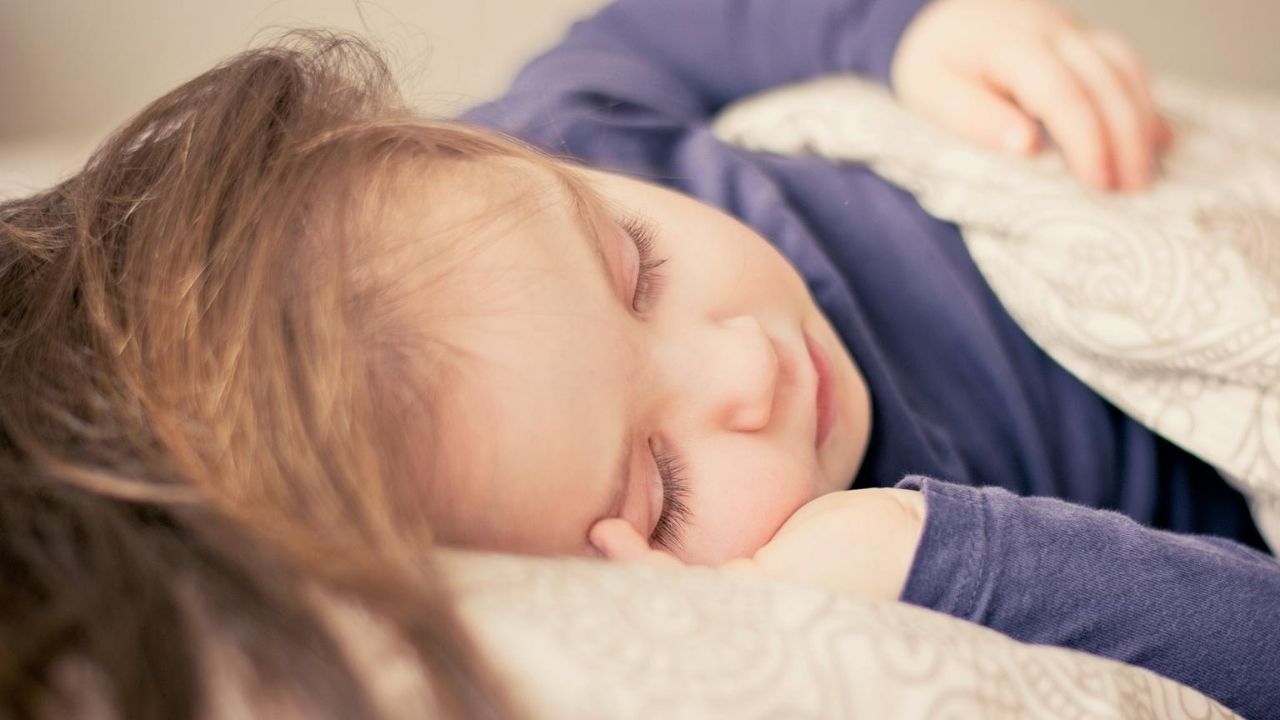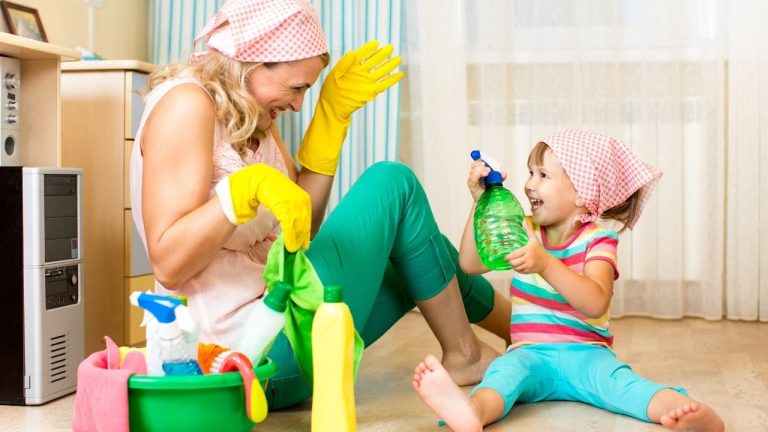Nighttime Potty Training for Heavy Sleepers: 9 Tips & Tricks
This post may contain affiliate links and we may earn commissions when you make a purchase through these links (at no extra cost to you). See our disclosure policy for more details.
Night Time Potty Training Hacks You Might Not Have Thought Of
Wondering how to get started on nighttime potty training for heavy sleepers? To be honest, most kids are deep sleepers, making it hard for the bladder’s “wake up” message to reach the brain during the night.
But if your child is potty trained during the day, then you’re probably wondering when you should start potty training at night.
Our 4-year-old just finished potty training a few months ago, and now our 20 month old is just starting to take a little interest in using the potty chair. So we’re right there with you!
Let’s answer a few questions you might have regarding the right time and age for nighttime potty training, whether you should wake your child to pee at night, and even bedwetting.

I am not a medical professional, and this information is not intended to replace medical advice.
When Should You Night Potty Train?
As you might have guessed, this answer will vary from one family to the next. Some children are ready to potty train at nighttime earlier than others, and there is no set age at which a child needs to start.
Not to mention, potty training is a daytime process and you can’t teach kids to do something while asleep. However, there are ways you can set them up for nighttime success.
My advice is to focus on a positive potty training experience during the day, and nighttime potty training will naturally follow.
Some kiddos will start waking up with a dry diaper or pull up without any official “training” — which makes things a lot easier for us!
At What Age Should My Child Be Dry at Night?
Again, there isn’t a “one-size-fits-all” answer. Some kids will naturally start staying dry at night earlier than others.
Three-and-a-half to four years old seems to be pretty average when it comes to nighttime potty training — my daughter was somewhere in this range.
And if your child has been potty trained for a while but is still wetting the bed at age five or six? There could be a number of reasons for bedwetting, and you’ll want to figure out why before trying to implement a “fix”.
Should You Wake Your Child to Pee at Night?
There is really no reason to wake your child to pee at night. It will simply disrupt their sleep, and won’t help them in the long run.
Of course, if they wake on their own during the night, that’s a different story.
And if they pee in their diaper or pull up, or if they wet the bed, help them get cleaned up and quickly move on.
It’s not easy when you’re half asleep, no doubt! But no amount of reprimanding will train them to stay dry during the night.
Nighttime Potty Training for Heavy Sleepers
Here are a few tips and tricks for gentle, child-led potty training a heavy sleeper at night.
1. Lower your expectations.
If your child has never stayed dry all night, it will take time and there will likely be accidents. Their bladders are pretty small so you’ll definitely want to keep your expectations in check!
In fact, there are plenty of adults with small bladders who need to get up and pee during the night. As we age, our bladders get better at telling our brains to wake up during the night when they’re ready to be emptied.
Of course, sometimes older children who still wet the bed at night are heavy sleepers and might need a little help from an external source.
Assuming there is no underlying cause, you could try something like a bedwetting alarm (scroll down to #6 if you’ve never heard of them before).
2. Establish daytime dryness first.
Daytime potty training is an obvious first step when it comes to potty training at night. If you want to follow a gentle, child-led approach, like we did, then it will likely take a little time. But it will happen.
Even though our firstborn started using the potty before her second birthday, she wasn’t wearing underwear full time until a few months before her fourth birthday — when she decided to stop using diapers.
Honestly, it sometimes feels like it’ll never happen, but with a little patience, your kiddo will be daytime potty trained in no time!
(But remember, even after a child is fully potty trained, accidents sometimes happen when they get too busy playing and can’t make it to the bathroom in time. Totally normal!)
3. Use diapers or pull ups at night.
While some people are completely against using pull ups, I found them — along with slip on diapers — to be a wonderful tool during the potty training process.
Honestly, normal diapers are a huge pain to take off and put back on when they have to use the toilet. Pull ups and slip on diapers make a quick trip to the potty much easier.
So even if they’re wearing underwear during the day, there’s nothing wrong with using diapers or pull ups until your child is staying dry through the night.
And if your child is like mine, they might even insist on wearing their favorite underwear to bed…when they’re ready for that step.
4. Let your child be the guide.
Even when using a child-led approach, you can still encourage him or her in a number of ways. For example, read books together about potty training, like “P” is for Potty.
Keep it positive so your child doesn’t associate potty time with a negative experience.
Before we moved, we frequently talked about how our daughter was going to start wearing underwear full-time after the move.
What do you know — the day we moved into our new house, she wanted to start going to the bathroom.
And within a couple weeks, she ditched the nighttime diapers (at her request!).
5. Protect the mattress from accidents.
Once your child starts wearing underwear to bed, you’ll want to be prepared for bedwetting. It may or may not happen — but it’s definitely likely!
It’s pretty easy to clean up if your child is sleeping in a toddler bed with a plastic mattress. Unfortunately, speaking from personal experience, it’s not so easy if they pee on a fabric mattress.
If your child sleeps on a regular fabric mattress, you’ll definitely want to invest in a good, water-resistant mattress protector.
6. Try a bedwetting alarm.
Got a child who’s long out of the potty training stage, yet still wets the bed at night?
A bedwetting alarm is a sensor that detects urine and wakes the child (and parent) up, so they can finish urinating in the toilet.
Of course, before investing in one, you’ll want to make sure there aren’t any other issues causing the bedwetting (such as a UTI or constipation).
We haven’t had to use one of these alarms, but I have heard good things about them.
7. Clean up accidents quickly and without a fuss.
While it’s certainly hard to clean up yet another accident without getting irritated, making your child feel ashamed will only make it harder to potty train them at night time.
Some kids will even resist and may want to start wearing diapers again.
Remain neutral and quickly clean it up. You might even reassure your child that accidents are normal, and that they can always try again next time.
8. Cut back on water drinking before bedtime.
Make sure your child is well hydrated during the day. This will help keep them from getting too thirsty at night and drinking a lot of water before bedtime.
After dinner, we have our daughter cut back on liquids, and we only let her have a sip of water before bedtime each night. I’m thrilled to report that she hasn’t had an accident in quite some time!
9. Visit a chiropractor for bedwetting.
It may sound odd, but chiropractic care can help the nerves controlling the urinary system organs function better.
Because the nerves affect every cell in the body, they can have an influence on the bladder. But taking the stress off of the nerves by restoring normal motion of the spine allows the organs to function properly.
If your child has been wetting the bed, it may be worth a try!
Related: Gentle Methods to Help Your Toddler Fall Asleep Faster
Why is My Child Wetting the Bed?
Do you have a child who has been potty trained for quite a while during the day, but frequently wets the bed at nighttime?
There could be a number of different reasons for bedwetting, from a urinary tract infection to constipation or, more commonly, an inability to recognize a full bladder.
A few more serious causes include:
- diabetes
- hormone imbalance
- urinary tract defect
If you’re unsure why your child is wetting the bed, it would be a good idea to visit with your pediatrician.
Tools for Potty Training at Night
And here is a recap of the recommended nighttime potty training tools.
2. Pull ups
5. Extra sheets
7. Training underwear
Potty training is a crazy process, but you’ll get there! Don’t give up on your child — they won’t be wearing diapers or pull ups at night forever.








ahh these tips are SO helpful! I’ve been reading more into potty training to be prepared for when the time comes and specifically night time potty training! I’m saving this for the near future 🙂
Honestly, waiting until our daughter chose to wear underwear overnight saved us so many headaches! She only had a few accidents overnight shortly after that, and hasn’t wet the bed in months. Good luck!!
This is so timely. I have a two-year-old and in many ways, she is so mature. Though we still haven’t achieved day-time dryness. I think she is scared of the potty. We’ve tried to let her walk around with nothing on and she pees on the floor 🤦🏻♀️
I got the “P” is for Potty book – she loves Elmo!
Oh, no! :o) I’ve had my girls pee on the floor, too… My 21-month-old likes to strip down completely, sit on the potty, then run around the house with nothing on. She thinks she’s hilarious! My girls like Elmo, too, and we actually have a couple Elmo potty books!